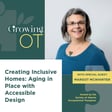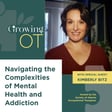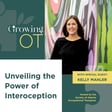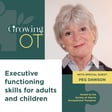
SOS Approach to Feeding with Dr. Kay Toomey
Join host Wilmari Myburgh and Dr. Kay Toomey, a feeding therapist and the founder of the SOS Approach to Feeding, as they discuss the complexity of eating and the causes of feeding problems.
In this episode, Dr. Toomey explains how cognitive shifts can contribute to problem feeding and when picky eating becomes a problem. She gives an overview of the Sensory-Oral-Sequential approach to feeding and explains the myths of eating. Dr. Toomey discusses the best first approach to feeding therapy and how to attend an SOS Training Conference. She also provides resources for listeners to connect with her and learn more about the SOS Approach to Feeding.
At the end of the episode, Wilmari and Dr. Toomey have some fun with a rapid fire question segment. Tune in to learn more about the complexity of eating and the SOS Approach to Feeding!
Jump through this episode using our timestamped chapters:
[00:00:02] Start
[00:00:29] An Introduction to Dr. Toomey and How She Got Involved in Feeding Therapy
[00:08:21] The Complexity of Eating: Understanding the Causes of Feeding Problems
[00:16:30] Cognitive Shifts and Picky Eating: When Does Picky Eating Become Problem Feeding?
[00:34:33] Exploring the Sensory-Oral-Sequential Approach to Feeding
[00:42:17] Tenets of the SOS Approach: Understanding the Myths of Eating
[00:49:47] Systematic Desensitization: The Best First Approach
[00:54:51] Attending an SOS Training Conference: The Foundation for Feeding Therapy
[00:59:18] Connecting with Dr. Toomey: Finding Resources on the SOS Approach to Feeding Website
[01:01:18] Fun Rapid Fire Questions





